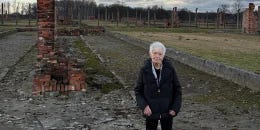Auschwitz Survivor Returns to Confront Harrowing Past
Ruth Cohen, 94, returns to the concentration camp where her family was murdered, 80 years after her first forced arrival.
BRZEZINKA, Poland — For nearly 80 years, Ruth Cohen had not returned to the place that marked the beginning of her family's tragedy. But on Tuesday, at the age of 94, she did. The destination was Auschwitz-Birkenau, a former Nazi concentration camp notorious for its brutality, where millions of Jews, including Cohen’s own family, met their deaths.
At just 14 years old, Cohen was sent to Auschwitz in May 1944, where she was separated from her mother, younger brother, and cousins, who were likely sent directly to the gas chambers. The trauma of that moment remained with her, as Cohen recalled, "It’s awful and it’s terrible… and the way I was told they are dead was terrible. I didn’t believe it. I believe it, of course, now."
Though it had taken her eight decades to return, the decision to do so was not without its emotional weight. Accompanied by a group from the United States Holocaust Memorial Museum, Cohen entered through the infamous “Arbeit Macht Frei” gate at Auschwitz I—where the sign’s cruel irony, proclaiming "Work Sets You Free," marks the grim history of forced labor and mass extermination.
As Cohen walked through the camp, memories flooded back. The first part of the tour brought overwhelming emotions. "I felt terrible... like my heart was going to go out completely," she admitted. Despite the heavy burden of the past, Cohen pushed forward with the resilience that had allowed her to survive so much.
Some places, however, she could not bring herself to visit. When her group moved to view the piles of hair from victims, Cohen stepped outside to avoid the harrowing sight. Later, she chose not to enter the gas chamber or crematorium, saying, “I can’t go in there. I don’t want to see where my family and whole world was killed.”
Born Renee Friedman in Czechoslovakia, Ruth Cohen's family was once prosperous, with her parents working as doctors, running a soup kitchen, and even owning a liquor business. But when the Nazis began their campaign of extermination, their lives were torn apart. Cohen’s mother, Bertha, her brother Ari, and her cousins Estee and Leo, along with many other relatives, were murdered by the Nazis. Cohen recalls how her family had even taken in the Haber cousins to protect them, only for them to be killed before their parents were.
In Auschwitz, Cohen was separated from her family, and while she was not held in the Auschwitz I part of the camp, she believes her father was. She recalls seeing him once through a fence at the nearby Auschwitz II-Birkenau, where she was imprisoned. She remembers seeing him carry blankets, likely headed toward the crematorium.
Though many details of her captivity remain blurred by the trauma, Cohen vividly recalls the conditions in the barracks where she was held. She stood at the site of the former barrack in Sector 2, Section C, Block 30, and shared the cramped living conditions. "Six of us slept this way. Six of us slept that way. So there were 12 in one little area," Cohen explained. The rudimentary wooden planks served as beds for the prisoners, with little separation between the women. She credits her survival to being able to share that space with her older sister, Teresa.
During the visit, Cohen posed for a photo at the site—a powerful moment of survival and defiance. "I’m fine. I’m here and I’m here and I’m here. And Hitler lost," she said, embodying the resilience that had carried her through decades of hardship.
After being transferred to other concentration camps and ultimately liberated, Cohen, along with her sister and father, rebuilt their lives in America. Now residing in North Bethesda, Maryland, Cohen volunteers at the U.S. Holocaust Memorial Museum’s "Survivors Desk," where she shares her story with visitors to ensure that the horrors of the past are not forgotten.
However, Cohen’s concerns about the world today remain deep. With rising levels of antisemitism and racism, she expressed fear for future generations. "Antisemitism is changing. Racism is changing. Racism in all forms, as well as antisemitism, and it’s frightening, and that’s what has to be fought," she warned. "The world seems to be getting worse rather than better. Nobody, nobody is remembering what happened."
Cohen returned to Auschwitz not just to confront her past, but to be a witness for the millions who perished. "I survived. I made a life. I have children, wonderful children, who are going to carry not my legacy, but my history," she said.
Her daughter, Barbara Cohen, was moved to tears when she found her grandmother’s name in the memorial book during the tour. "It’s just so real. I mean, my grandmother is part of me," Barbara said.
Reflecting on the lessons of her experience, Ruth Cohen offered a powerful message: "I could say it in one word: love… Love will never permit something like this to happen. Hate might."
Through her return to Auschwitz, Cohen reaffirmed her mission to prevent future atrocities and ensure that the story of her family—and the millions like them—is never forgotten.


